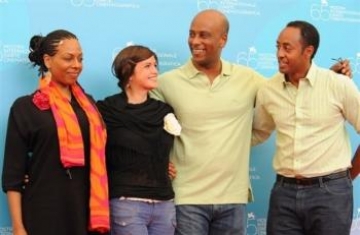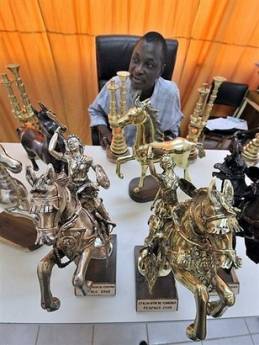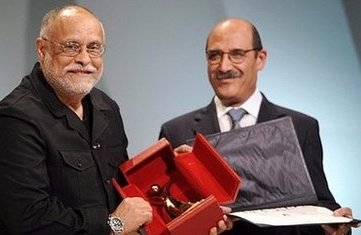
Above: Actors (from left) Evelyn Arthur Johnson, Veronika
Avraham, Aaron Arefe and Abeye Tedla (From official Venezia
65 Awards )
NYT (Culture News and Views)
By Steven McElroy
“Teza,” an Ethiopian film about the ruthless regime of the former dictator Mengistu Haile Mariam, who was in power in Ethiopia from 1974 until 1991, won the Golden Stallion of Yennenga, the top prize at the Fespaco film festival in Burkina Faso, Reuters reported. The film’s Ethiopian-born director, Haile Gerima, currently lives in the United States and his sister Selome Gerima, who also co-produced the film, accepted in his honor at the event, which plays a similar role in Africa to the Academy Awards in the United States. Read More.
Ethiopian film takes top prize at Africa film festival
OUAGADOUGOU (AFP) – The Ethiopian film “Teza” by director Haile Gerima took the Golden Stallion of Yennenga on Saturday for best film at the Pan-African Film and Television Festival.
The jury’s unanimous pick for top honours, “Teza” deals with the brutal regime of dictator Haile Mariam Mengistu in the 1970s and 1980s.
It revolves around an idealistic scientist who returns to Ethiopia during the Mengistu regime. Beautifully filmed, “Teza” switches between present and past in a series of flashbacks between protagonists time studying in Germany in the 1970s, Ethiopia in the 1980s and the present.
It deals with big themes — emigration, return, dictatorship, racism, war and the position of women — without getting preachy.
Gerima (pictured above left with Tunisian Culture Minister Abderraouf Basti) was not present in Ouagadougou to collect the award, so his sister Selome Gerima, who co-produced the film, accepted it on his behalf.

Burkina Faso’ sculptor Ali Mikiema shows
the Golden Stallion of Yennenga prize, Africa’s
answer to the Oscar at the Pan-African Film
and Television Festival (FESPACO) in
Ouagadougou.



























Congratulations to Professor Haile and his entire Teza’s film crew for winning such a prestigious award. Professor Haile uses film to document and narrate the consequences of violent political power in Post Haile Selassie Ethiopia. I also think that Teza is an attempt to bridge the gap between Ethiopians at home and abroad. It is only when the Diaspora engages the motherland wholehertedly, free of partisanship, that we begin to see the realization of visions and dreams – visions and dreams of just and democratic Ethiopia, rushing to transform immense potentials into alphabets of development and progress. Ayele
The John H. Johnson School of Communications is so very proud of Professor Gerima, who has been on our faculty for nearly 30 years!
Congratulation Professor Haile!
Here is a video about the award: http://www.ethiotube.net/video/2840/Ethiopian-film-wins-African-Oscar
Congratulations to one of our most conscientious filmmakers
Congratulations to Mr. Haile Girma – we are proud of you as ethiopians
you had all the courage to show us how we suffered?
God Bless the entire crew of Teza
Prof Gerima is a pride of Africa. This is an extraordinary movie depicting the challenge of Africa. Powerful yet non-judgmental, it shows how, misguided by foreign ideology, we failed Africa, in this case Ethiopia.
This is a ‘must see’ movie for all Africans and particularly Ethiopians. A movie that deserves many ‘Oscars’!
Samuel
Dr. Haile,
I am really proud of you. Thank you for the attempt you took to make the second Holy Wood in Ethiopia. I hope, with your effort and efforts of other Ethiopians like you, Ethiopian movies will one day reign over the heart of everbody in the world. Tell to other African countries that this is how film is made by Africans. Tell them very well that though we are economically poor we can produce the best movie not less that the best of the holy wood. Thank you for showing us that film making is not just holding camera and running after the one we call actor or actress. Fim making is a wisdom. You are full of wisdom. I thank God for you.
Few decades back,in the sweltering California summer,and by sheer coincidence I found myself in the same room where you (Haile Gerima) were also present to take a second look on what would be the best political course for our country ,Ethiopia. You were still a film student at UCLA. As apolitical as I was, I was able to follow your passionate narration of what might be the best course for our country in light of the Emperor’s demise. the reception from the self-styled ‘Marxists’ was cool at best, & downright dismissive at worse. I don’t recall what you exactly said, but for the past 35 years it had been lingering in my subconscious. Recently, I watched one of the interviews you gave about your oddessy as a filmmaker. When asked about your own happiness, you replied it with such thoughtfulness and authenticity I quote “…I had a happy childhood and I live-off the happiness from my childhood (my past).” With one seemingly simple sentence you might have captured the feeling of hundreds and thousands of Ethiopians ( myself included) in the Diaspora. By the time we begrudgingly accepted our new identity as “immigrants” amidst an alienating culture, any possibilty for our ‘happiness’ might have been compromised irretrievably… as you alluded on that interview, just like you, we all have to live-off the happiness we brought to the new land rather than attempt to replace it with something that has no respect for our past.
betemariam .
Prof Gerima, Expect nothing less than Excellence always in his body of work.
Always thought provoking, ground breaking, and Cultural Pride.
Very disappointed in this movie as it really did not explain the deep problems that led to the violence in 70s and 80s. Haile pretends that the idealistic generation that tried to address the problems of Ethiopia such as feudalism. religion and ethnicity were just pure ideologues only concerned about marxism=leninism. Why does he not show the problems they were trying to address to better understand them? Why not explain why Dergue and Mengistu came about?
Where is the Wollo drought in the movie? Where is the oppression of non-amharas by Amharas in this story? Where is the Eritrean liberation war in this movie? Why does he not mention the TPLF’s war against Amharas? Why not mention that Mengistu is the son of a slave, and he represented the rejection of Haile Sellassie’s aristocratic rule? Instead of showing the racism in Germany, why does Gerima not show the xenophobia of Ethiopians against Muslims, “gallas” and most of all the people of Gambella?. In fact did not countries like Germany give asylum to ethiopians?
Also, why exactly is a child murderer the heroine of the movie and why should we have sympathy for her?
Not to say the movie did not have positive attributes. Haile did unmask the violent political culture of Ethiopia.
But, all in all, a pretentious movie.
I have so many reasons to be proud of Ethiopia and Professor Haile Gerima is one among them. I am following his footsteps to become a visionary filmmaker like him. I hope one day I will talk on public that he is my inspiration. May God bless him and his family!
Wishing him long life and the industry!
Girma Asefa
Aspiring FilmMaker
Cameraman and Editor.
Maryland
i leave in addis abeba and am learning film.gash haile is my hero and our hero.gash haile God be with u.
Congratualtions Haile, Selome, and entire crew! Once again Haile has raised the bar and our consciousness. Success is an outward expression of the inner core of our humanity and Haile is one of the greatest and most successful filmammkers of our time. Thank you for your leadership. Peace and Blessings!
I just watched “TEZA” a couple of days ago. Haile Gerima has taken the film industry one level higher than anyone else in my view. This movie is a ground braking experience. I was carried by emotion watching the whole movie which was real, vivid and amazing. Ethiopia is really proud to have such a great son. Gerima has brought a genious to this world.